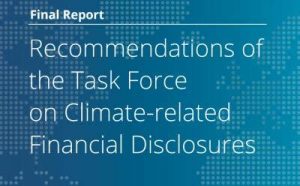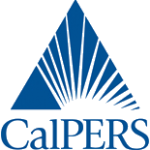Issue 1.1 – August 2017
More climate-related disclosure in your company’s income statement / cash flow statement / balance sheet? How will your company be affected? How will you be affected by the FSB TFCD guidelines for your company’s ESG disclosure?
T he Financial Stability Board (FSB) is a global, multi-stakeholder organization that brings together senior policy makers from the G20** nations plus leaders from the European Union, Hong Kong, Singapore, Spain, and Switzerland.
he Financial Stability Board (FSB) is a global, multi-stakeholder organization that brings together senior policy makers from the G20** nations plus leaders from the European Union, Hong Kong, Singapore, Spain, and Switzerland.
The Board’s convenings include key central bankers, sovereign regulatory leadership, bank and financial sector oversight leaders, and others; they collaborate to create “financial stability” policies for countries to follow. (These are not mandates, not replacements for existing sovereign authorities) that those at the table; thought leaders can also take home and implement recommendations in various ways.)
There are six regional “consultative groups” that help to coordinate activities in an additional 70-plus countries, including in developing economies & emerging markets.
In this way as financial sector policies are being formulated there is help available from more experienced professional (such as professional colleagues in developed nations — the G20 plus four).
The work of the FSB is all about addressing risk in the financial services sector — identifying risk, addressing risk, avoiding risk, developing protective risk management approaches for underwriters (insurance companies); lenders (banks); investors (asset managers and asset owners).
This includes evaluation of risk for corporate issuer assets in portfolios; insurance underwriting; lending; and other activities in the financial services sector — and by extension to thousands of public and private companies the sector does business with.
And the focus is on “risk” for all of these entities and their activities – therefore, there is the looming question of the possible impacts of a changing climate on assets.
The Finance Ministers and Central Bankers of the nations in the G20 asked the FSB to address this rapidly-evolving challenge and to review and make recommendations on how the financial sector can take account of climate-related issues.

The FSB convened a “Task Force on Climate-Related Financial Disclosures — the FSB TCFD*.
The task force is headed by Chair Michael Bloomberg (he’s former mayor of New York City, principal of Bloomberg LP, UN Envoy to Cities, chair of the SASB, etc.).
Mr. Bloomberg leads the 32-member task force; the work began in December 2015. There were numerous invitations to stakeholders to submit suggestions (such as the American Bar Association); public meetings were held; industry input was solicited — and at year-end 2016 the recommendations were being drafted for public release in late-June 2017, and publicly released in summer 2017
QUICK REVIEW
The primary aims of the task force work were:
- To develop recommendations for climate-related disclosures that could promote more informed investment, credit, lending, and insurance underwriting decisions;
- This, in turn, would enable stakeholders to understand the carbon-related assets in the financial sector and the financial system’s exposure to climate-related risks through their activities.

The recent release of the task force’s draft report is an important heads up to boards and managers in many sectors — the carbon-related risk / the climate change risk is now abe very important consideration for the financial sector players going forward, in the various ways they do business with your company.
It is important to note that the FSB task force focused on the possible financial impact of climate change on a corporation, especially in the financial services sector — and by extension of the impact of the corporation on the environment.
This approach covers the two halves of the capital markets whole: public companies seeking capital and those providing the capital (or dealing with other aspects related to the company).
These are the four top-line thematic areas for corporate disclosure on climate change matters across sectors and industries; these are to be disclosed in either the regular public filings or in supplemental reports on a voluntary basis (at least so far):
- The Corporate Governance Factor
The organization’s governance structure around climate change risk and opportunities (in the USA, the SEC has reminded public company boards of directors of their responsibility to oversee risk which includes climate change). - Strategies / Strategy-Setting
Assessing the current and potential impacts of climate risks on the company’s strategies, and, operations, business, and financial planning. - Risk Management
The company should identify, assess and manage climate-change risks and publicly disclose the processes used to do this. - Metrics / Targets To Be Set
What are the metrics used and targets set by the organization to assess and manage climate- related risks and opportunities? These should be explained to stakeholders.
Think about the approach of the FSB TCFD guidelines in this way:
- There are transition risks for a company which will include: policy, legal; technology; markets; corporate reputation issues. The transition is often envisioned as the enterprise and the economy moving towards a low-carbon economy.
- Transition opportunities for companies will include examination of and planning for: enhancements in resource efficiency; varied energy uses / sources / types; development of innovative products & services; building corporate resilience.
All of the above could and do have an impact on the company’s financials — its revenues and expenditures.
- The impacts should be reflected in key corporate disclosures: the 10K, the proxy statement, the income statements; cash flow statements; balance sheets.
- Which then impacts: corporate assets and liabilities; capital sourcing and and financing.
- All of this is the province of the board of directors and the C-Suite of the public company. The responsibility is clearly at the top of the organization in the Task Force work.
What business is your company in? How resilient to climate-related risk is your company? Are you taking advantage of opportunities?
There is [Task Force] Guidance for Financial and Non-Financial companies in certain sectors.
- For Financial Markets
Banks; Insurance Companies; Asset Managers; Asset Owners. - For Non-Financial Players – Users of Capital
Energy; Transport; Materials & Buildings; Forest Products (these are identified as accounting for the largest proportion of GHG emissions, energy usage, and water usage). - The task force suggests that companies in these sectors with more than US$1 billion in annual revenues should also consider disclosing strategy and metrics and target(s) information in other reports when the information is not considered to be material and therefore included in the required periodic financial filings.
It is expected that the adoption/uptake of the FSB task force recommendations will steadily increase over time, as companies disclose important information and [especially] as financial sector firms utilize the information in various ways.
The task force adopted a five-year time frame for development of quality and consistency of reporting as suggested by the recommendations.
Keep in mind: the recommendations are especially important considerations for (1) corporate energy producers and (2) the enterprises using energy (such as for industrial process, energy-producing utilities).
THE ULTIMATE GOAL:
Broad understanding of the concentration of carbon-related assets in the global financial system — and the financial system’s exposure to climate-related risks.
The task force will be monitoring implementation of the recommendations beginning in late-2017 and into 2018 and will engage with stakeholders going forward.
The investment community will be encouraging “assets” (such as companies in portfolio or the insured or borrower) to adopt practices suggested in the recommendations.
How did the corporate community react to these recommendations?
- FSB says more 100 companies with combined market caps of US$3.3 trillion [and] financial community firms with more than $24 trillion in AUM provided statements of support, encouraging the embrace of the TFCD recommendations.
- The FSB task force recommendations closely align with other public disclosure standards and frameworks. Adoption would move a company in the direction of an integrated reporting structure.
The SASB recommendations for sustainability disclosure in the 10-k are closely aligned with material information (and materiality is thoroughly addressed by the task force).
It’s important to keep in mind: The GRI Standards, taking effect in January 2018, replaces the current G4 framework for all corporate reporting; the Standards will definitely move companies in the direction of the FSB TFCD recommendations.
If you have questions about the task force recommendations and the impact on your company, or the opportunities presented for enhanced disclosure for investors and stakeholders, the G&A Institute team is available for a conversation.
We are monitoring the uptake of the important climate change disclosure recommendations by U.S. and global companies going forward.
The G&A team is helping companies to adjust to the expectations of their investor base (especially in conducting “scenario planning for climate change” and disclosing on same).
We are specialists in corporate sustainability reporting and disclosure.
For information about the Task Force recommendations:
https://www.fsb-tcfd.org/
For information about the Financial Stability Board (FSB): http://www.fsb.org/
NOTES
* The Task Force Vice Chairs include Graeme Pitkethly, CFO Unilever; Denise Pavarina, Managing Officer Banco Bradesco; Christian Thimann, Group Head, Strategy, Sustainability and Public Affairs, AXA; and Yeo Lian Sim, Special Advisor, Singapore Stock Exchange.
Task Force Members include leaders at KPMG; BlackRock; Generation Investment Management; JP MorganChase; UBS Asset Management; Moody’s; Tata Group; Ernst & Young; Barclays; Bank of China; Deloitte; PGGM; Swiss Re; BHP Billiton; HSBC; Storebrand; Aviva Investors; ENI; S&P Global Ratings; Tokio Marine Holdings; Canada Pension Plan Investment Board; Daimler; Air Liquide Group; Dow Chemical; EnBW; PGGM.
** The Group of Twenty (“G20”) nations comprise an international forum for discussing economic, financial and related issues. The 20 countries account for more than 80% of the world Gross Domestic Product and almost the same amount of world population.
The first meeting of the Group was in Berlin in late-1999; there have been almost two dozen meetings since then; attendees include heads of state. (The initial participants were finance ministers and central bank leaders — the same players who asked for the Task Force to go to work on expanding corporate disclosure on climate change issues.)
The nations are: Argentina, Australia, Brazil, Canada, China, France, Germany, India, Indonesia, Italy, Japan, Mexico, Russia, Saudi Arabia, South Africa, Turkey, United Kingdom, and United States of America. Other members are the European Union; the European Central Bank; Spain, a “non-member” that attends leader summits.
Also participating: Chair, ASEAN Association of Southeast Asian Nations; African Union; New Partnership for Africa’s Development (NEPAD).
The G8 is a smaller group: Canada, France, Germany, Italy, Japan, United Kingdom, and United States of America. This was the G7; Russia was added (the eighth) and then suspended after the annexation of Crimea in 2014. The G7/G8 focus is on issues in the more developed industrial economies.
If you are interesting in learning more about the work of Governance & Accountability Institute and its portfolio of resources, tools and service offerings, please click here





